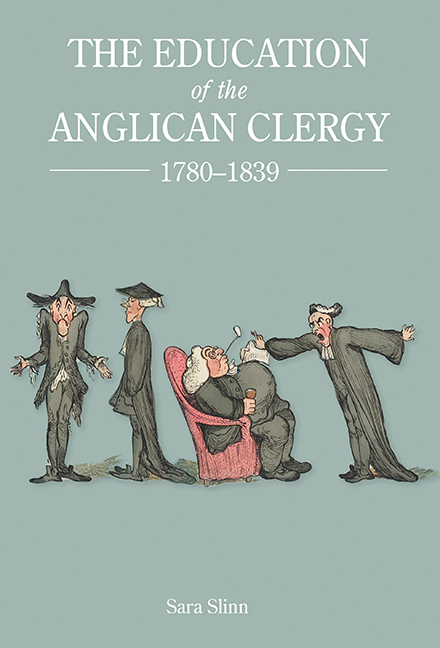Book contents
- Frontmatter
- Contents
- Illustrations
- Acknowledgements
- Abbreviations
- Introduction
- Part One Entrants to the Clerical Profession, 1780–1839
- Part Two Routes to Ordination
- 3 The Ordinand and the University
- 4 Literate Clergy and the Grammar Schools
- 5 Autodidacts, Tutors for Orders and Parish Clerical Seminaries
- Conclusion
- Appendix 1 Ordination Profiles of Bishops, 1780–1839
- Appendix 2 A Note on Methodology
- Bibliography
- Index
- Miscellaneous Endmatter
3 - The Ordinand and the University
from Part Two - Routes to Ordination
Published online by Cambridge University Press: 30 August 2017
- Frontmatter
- Contents
- Illustrations
- Acknowledgements
- Abbreviations
- Introduction
- Part One Entrants to the Clerical Profession, 1780–1839
- Part Two Routes to Ordination
- 3 The Ordinand and the University
- 4 Literate Clergy and the Grammar Schools
- 5 Autodidacts, Tutors for Orders and Parish Clerical Seminaries
- Conclusion
- Appendix 1 Ordination Profiles of Bishops, 1780–1839
- Appendix 2 A Note on Methodology
- Bibliography
- Index
- Miscellaneous Endmatter
Summary
In the eyes of the Established Church, a graduate clergyman was almost certainly a man who had taken a degree at either Oxford or Cambridge university. Whilst degrees were theoretically acceptable from Trinity College, Dublin, few Irish graduates presented themselves for deacons’ orders in the English and Welsh dioceses between 1780 and 1839. And although two new universities, at Durham and London, were founded at the end of this period, they were an insignificant source of ordinands. The other universities that were broadly accessible – those of Scotland and continental Europe – were outside the Anglican world and largely beyond the pale. The relationship between Oxbridge and the Scottish universities was soured by a series of vitriolic exchanges in periodicals and pamphlets which variously impugned the teaching methods and scholarship of the two very different educational systems. Continental universities, especially those in Germany, were tainted with a reputation for radicalism – both political and, increasingly, theological. Graduates of Scottish and continental universities thus found their degrees discounted and were usually classified by bishops as literates, even if their courses of study had included knowledge and skills essential for clerical function. Such men were occasionally admitted to orders, but they were few. The issue of two different university systems operating under different established churches cut both ways. Not only were Scottish graduates at a disadvantage if they wished to minister in the Church of England, but English degrees were depreciated in the Church of Scotland, both as a result of confessional inconsistencies (English graduates subscribed to the thirty-nine articles, whereas Scottish probationer clergy subscribed to the Presbyterian Westminster Confession) and on the grounds of curriculum and length: English degrees were seen to be slighter. Certainly no well-advised aspirant ordinand for the Church of England, able to meet the expense, would have considered enrolling at any university other than Oxford or Cambridge.
Having said this, and despite the fact that the majority of those who took degrees went on to take orders, neither university offered an education which was well aligned with the majority vocational destination of graduates.
- Type
- Chapter
- Information
- The Education of the Anglican Clergy, 1780–1839 , pp. 109 - 128Publisher: Boydell & BrewerPrint publication year: 2017



